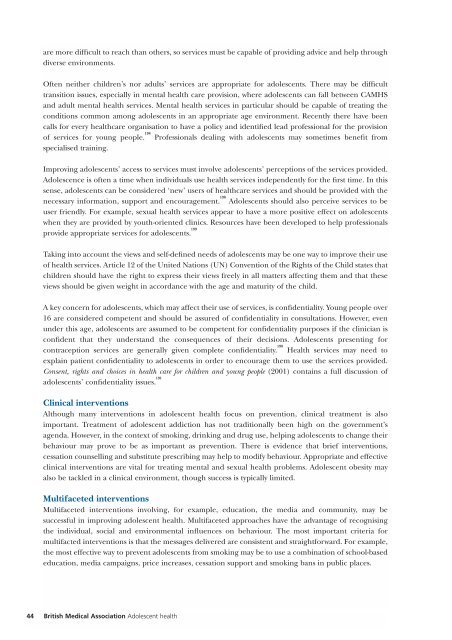Alcohol misuse: tackling the UK epidemic - London
Alcohol misuse: tackling the UK epidemic - London
Alcohol misuse: tackling the UK epidemic - London
You also want an ePaper? Increase the reach of your titles
YUMPU automatically turns print PDFs into web optimized ePapers that Google loves.
44<br />
are more difficult to reach than o<strong>the</strong>rs, so services must be capable of providing advice and help through<br />
diverse environments.<br />
Often nei<strong>the</strong>r children’s nor adults’ services are appropriate for adolescents. There may be difficult<br />
transition issues, especially in mental health care provision, where adolescents can fall between CAMHS<br />
and adult mental health services. Mental health services in particular should be capable of treating <strong>the</strong><br />
conditions common among adolescents in an appropriate age environment. Recently <strong>the</strong>re have been<br />
calls for every healthcare organisation to have a policy and identified lead professional for <strong>the</strong> provision<br />
of services for young people. 198<br />
Professionals dealing with adolescents may sometimes benefit from<br />
specialised training.<br />
Improving adolescents’ access to services must involve adolescents’ perceptions of <strong>the</strong> services provided.<br />
Adolescence is often a time when individuals use health services independently for <strong>the</strong> first time. In this<br />
sense, adolescents can be considered ‘new’ users of healthcare services and should be provided with <strong>the</strong><br />
necessary information, support and encouragement. 198<br />
Adolescents should also perceive services to be<br />
user friendly. For example, sexual health services appear to have a more positive effect on adolescents<br />
when <strong>the</strong>y are provided by youth-oriented clinics. Resources have been developed to help professionals<br />
provide appropriate services for adolescents. 199<br />
Taking into account <strong>the</strong> views and self-defined needs of adolescents may be one way to improve <strong>the</strong>ir use<br />
of health services. Article 12 of <strong>the</strong> United Nations (UN) Convention of <strong>the</strong> Rights of <strong>the</strong> Child states that<br />
children should have <strong>the</strong> right to express <strong>the</strong>ir views freely in all matters affecting <strong>the</strong>m and that <strong>the</strong>se<br />
views should be given weight in accordance with <strong>the</strong> age and maturity of <strong>the</strong> child.<br />
A key concern for adolescents, which may affect <strong>the</strong>ir use of services, is confidentiality. Young people over<br />
16 are considered competent and should be assured of confidentiality in consultations. However, even<br />
under this age, adolescents are assumed to be competent for confidentiality purposes if <strong>the</strong> clinician is<br />
confident that <strong>the</strong>y understand <strong>the</strong> consequences of <strong>the</strong>ir decisions. Adolescents presenting for<br />
contraception services are generally given complete confidentiality. 198<br />
Health services may need to<br />
explain patient confidentiality to adolescents in order to encourage <strong>the</strong>m to use <strong>the</strong> services provided.<br />
Consent, rights and choices in health care for children and young people (2001) contains a full discussion of<br />
adolescents’ confidentiality issues. 191<br />
Clinical interventions<br />
Although many interventions in adolescent health focus on prevention, clinical treatment is also<br />
important. Treatment of adolescent addiction has not traditionally been high on <strong>the</strong> government’s<br />
agenda. However, in <strong>the</strong> context of smoking, drinking and drug use, helping adolescents to change <strong>the</strong>ir<br />
behaviour may prove to be as important as prevention. There is evidence that brief interventions,<br />
cessation counselling and substitute prescribing may help to modify behaviour. Appropriate and effective<br />
clinical interventions are vital for treating mental and sexual health problems. Adolescent obesity may<br />
also be tackled in a clinical environment, though success is typically limited.<br />
Multifaceted interventions<br />
Multifaceted interventions involving, for example, education, <strong>the</strong> media and community, may be<br />
successful in improving adolescent health. Multifaceted approaches have <strong>the</strong> advantage of recognising<br />
<strong>the</strong> individual, social and environmental influences on behaviour. The most important criteria for<br />
multifacted interventions is that <strong>the</strong> messages delivered are consistent and straightforward. For example,<br />
<strong>the</strong> most effective way to prevent adolescents from smoking may be to use a combination of school-based<br />
education, media campaigns, price increases, cessation support and smoking bans in public places.<br />
British Medical Association Adolescent health
















